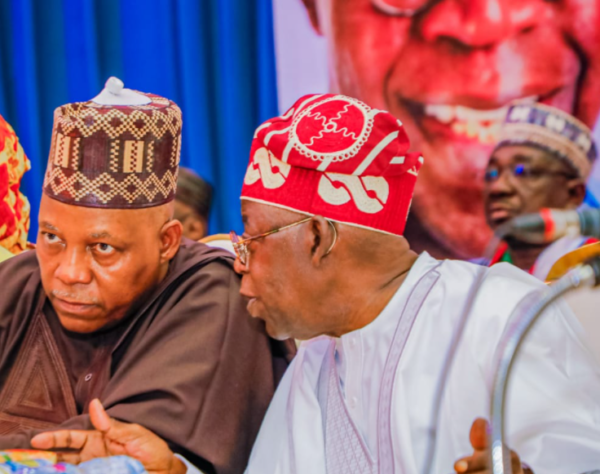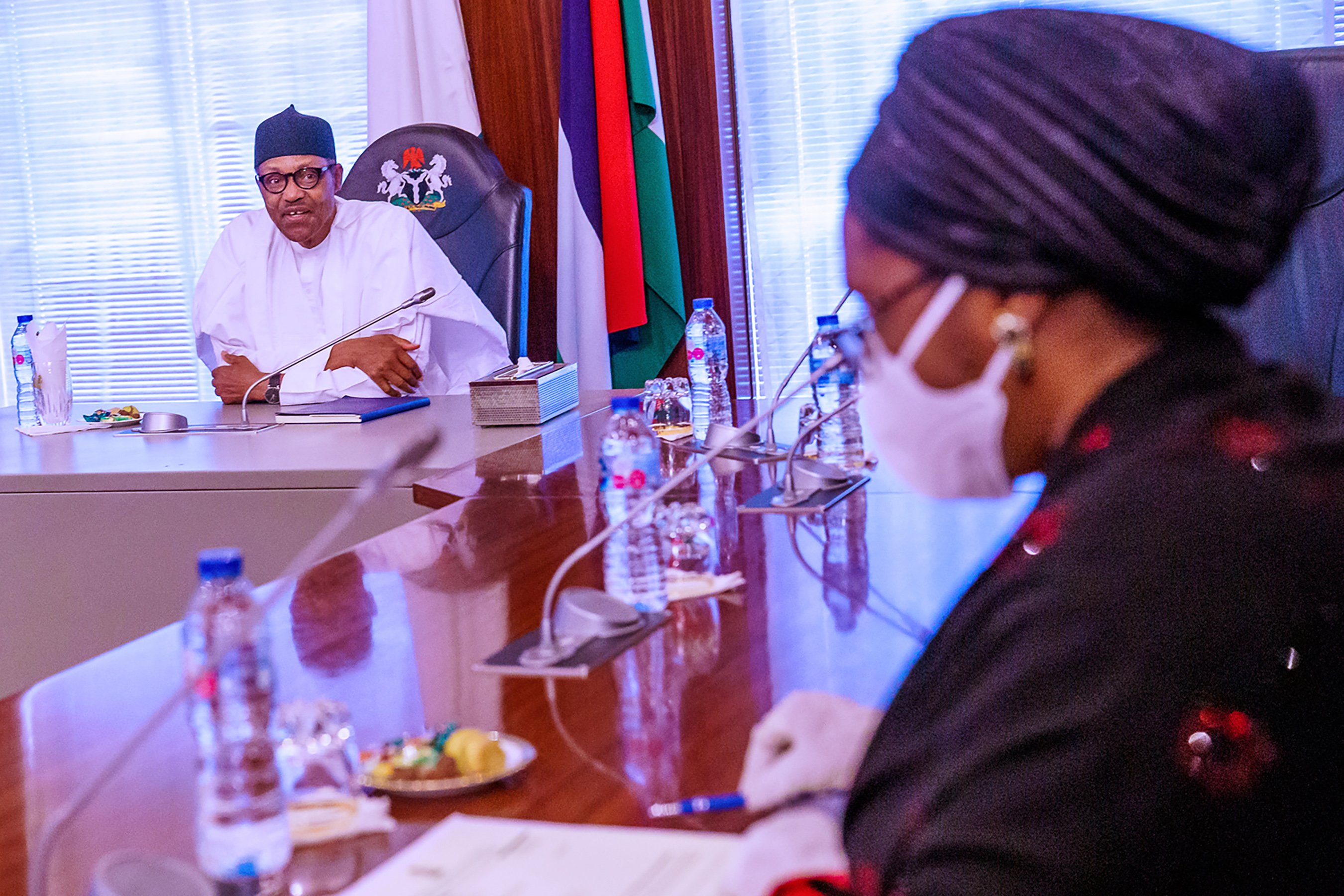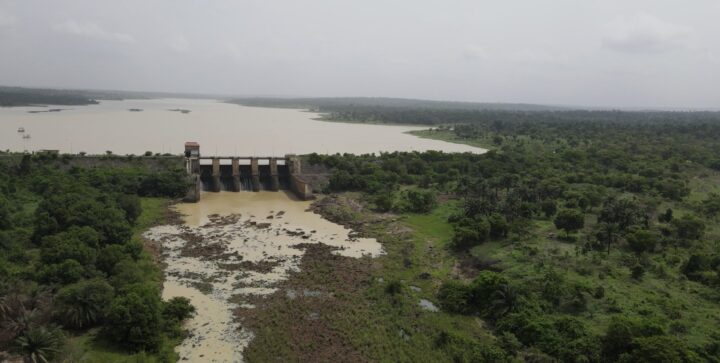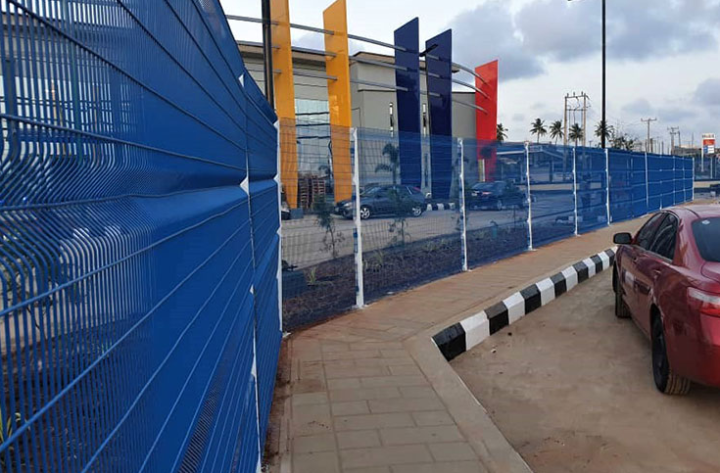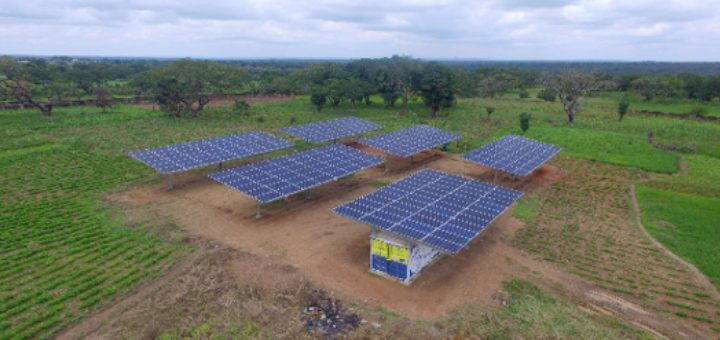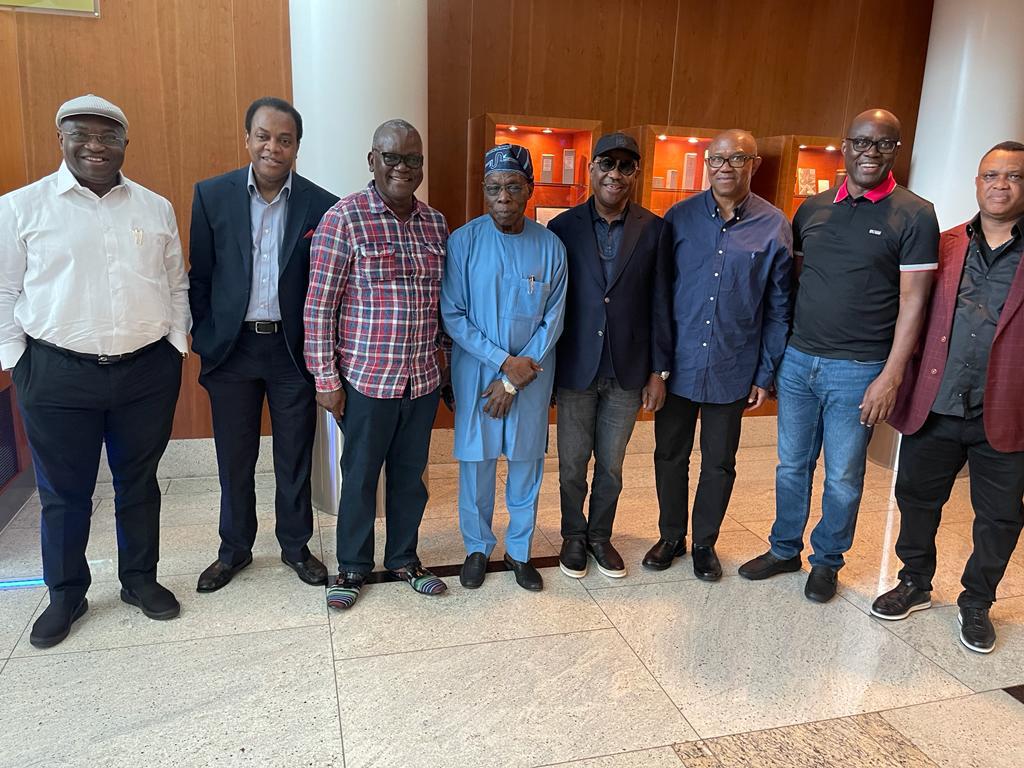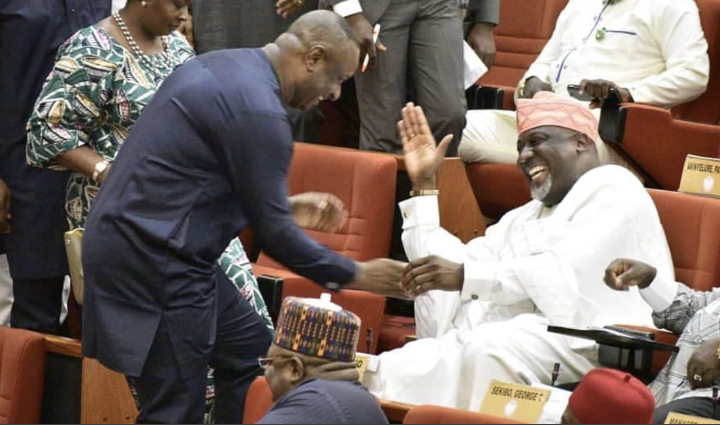Kashim Shettima, the vice-presidential candidate of the All Progressives Congress (APC), recently claimed that Lagos is the third biggest economy in Africa.
The former Borno governor spoke on Monday at the ongoing annual general conference of the Nigerian Bar Association (NBA), where he represented Tinubu, the presidential candidate of the APC.
While making a case for Tinubu and providing reasons why he believes his principal stands out among other presidential candidates, Shettima said Lagos is the third largest economy in Africa.
“When Asiwaju Bola Ahmed Tinubu became the governor of Lagos state in 1999, there was only one ambulance in the service of the Lagos state government. Lagos was earning a sum of N700 million as the internally generated revenue (IGR),” he said.
Advertisement
“Now, Lagos is earning N51 billion every month, Lagos is the third largest economy in Africa,” Shettima added.
Incoming Vice President, Senator Kashim Shettima breaking the entire table at the NBA Conference earlier today pic.twitter.com/bmB2TAZFSU
— Daddy D.O🇳🇬 (@DOlusegun) August 22, 2022
Advertisement
But this is not the first time Tinubu’s running mate would make the claim.
In a video shared multiple times on Twitter on August 5, Shettima said: “What Nigeria needs right now is the leadership that will drive the transformation process…Asiwaju Bola Ahmed Tinubu has a track record of excellence, Lagos is now the third largest economy in Africa.”
The video was first posted by a Twitter handle, @Progressive4BAT, a Twitter account known to support Tinubu. The video has since gotten more than 130,000 views.
Advertisement
On August 6, the same video was posted on Twitter by Festus Keyamo, minister of state for labour and employment, who doubles as spokesperson of the APC Presidential Campaign Council, with the caption: “well said, your excellency”.
Well said, your Excellency. pic.twitter.com/V15XXVs4Ex
— Festus Keyamo, SAN, CON, FCIArb (UK) (@fkeyamo) August 6, 2022
Advertisement
Tinubu once called Lagos ‘largest economy in Africa’
In April 2022, Tinubu met with fifteen APC state assembly speakers at a forum hosted by the Lagos house of assembly.
In a report published by Daily Trust, Tinubu — while marketing himself in the run-up to the APC presidential primaries — said his administrative prowess as former governor of Lagos helped the state to become the largest economy in Africa.
Advertisement
“I was raised to be courageous and this has been working for me. With zero allocation from FAAC, I turned Lagos State around and today, the state has become the largest economy in Africa. I reserve the right to brag. I want to bring same to bear as President of Nigeria,” Tinubu was quoted to have said.
Did Lagos get zero allocation from the federation account between 1999 and 2007? Are the APC presidential candidates –Shettima and Tinubu — right about the size of Lagos’ economy?
Advertisement
Here is what we found.
Did Lagos get zero allocation from the federation account during Tinubu’s tenure?
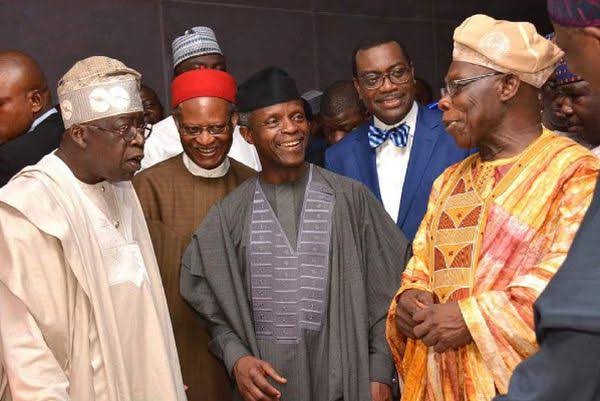
On Saturday, March 27, 2004, elections were conducted by the state government to create 57 LGAs in accordance with Local Government Areas Law No. 5 of 2002 of Lagos State.
Advertisement
Ebonyi, Katsina, Nasarawa and Niger states also created new LGAs at the same time as Lagos.
Former president Olusegun Obasanjo in a letter addressed to Nenadi Usman, minister of state for finance during his administration, said: “As the National Assembly is yet to make the necessary consequential provisions in respect of any of the newly created Local Government Areas in the country, conducting election under or funding any of them from the Federation Account would clearly be a violation of the constitution.
“Consequently, no allocation from the Federation Account should henceforth be released to the Local Government Councils of the above-mentioned States and any other State that may fall into that category, until they revert to their constituent Local Government Areas specified in Part I of the First Schedule to the Constitution.”
Following the directive by the federal government to withhold funding for the LGAs in the affected states, other states returned to the status quo except for Lagos, which opted for litigation.
Yemi Osinbajo, then attorney-general of Lagos, argued that Obasanjo, under section 162 subsection (4) and (5) of the 1999 constitution, could only exercise executive powers and not legislative or judicial authority to withhold funds due to the local government from the federation account.
The supreme court in its judgement indicated that the president does not have the power to withhold the funds for 20 local government areas. It also instructed that the funds be released.
However, the judgement did not recognise the new local government areas created by the Lagos state government.
Despite the judgement, the federal government withheld local government funds from April 2004 until the end of both Tinubu and Obasanjo’s administrations. The funds were later released to the next Lagos state administration by Umar Musa Yar’Adua, Obasanjo’s successor.
TheCable spoke with Muda Yusuf, a former director-general of the Lagos Chamber of Commerce and Industry (LCCI), to confirm the claim that the state got “zero allocation”.
“It was zero allocation to the local governments and not the state,” the economist said.
Data from the Central Bank of Nigeria (CBN) show that Lagos received N11.7 billion statutory allocations from the federal government in 2001. Several links to the CBN archive which ordinarily would reveal state allocation for other years between 1999 and 2007 when Tinubu was governor are currently broken.
Based on data from the Office of the Accountant General of Federation (OAGF), BudgIT, in its Lagos state Data book published in 2018, revealed that Lagos received a net FAAC allocation of N48.62 billion in 2007, the year Tinubu left office.
Verdict
At no time during Tinubu’s administration was Lagos denied state allocation from the federation account, only local government funds were suspended from 2004 to 2007. The claim that Lagos state had zero allocation is false.
Was Lagos IGR in 1999 N700m as Shettima claimed?
Shettima said Lagos earned N700 million as internally generated revenue in 1999 and presently earns N51 billion monthly. Here is what we found.
According to CBN data quoted by a journal published in the Research Academy of Social Sciences, Lagos recorded annual IGR of N14.6 billion in 1999, representing a monthly average of N1.2 billion.
This is against the N700m quoted by Shettima and the N600m widely circulated in the media.
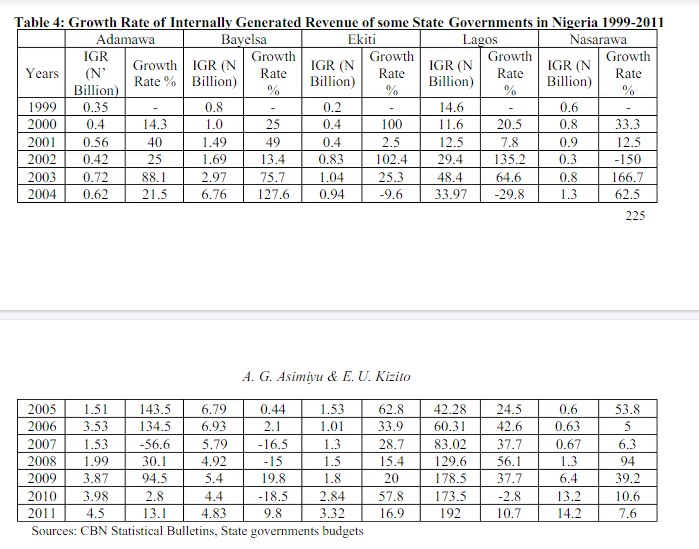
When Tinubu left office in 2007, the figure rose to N83.02 billion, a monthly average of N6.9 billion. Between 1999 and 2007, the IGR growth rate of Lagos stood at 468.63 percent, showing a considerable increase.
Akinyemi Ashade, former commissioner of finance in Lagos, disclosed in 2018 that the monthly average IGR of the state was N34 billion.
Going by the most recent IGR data by the National Bureau of Statistics (NBS), the 2021 half-year report shows that Lagos generated N267 billion in the first six months of 2021, a monthly average of N44.5 billion — not N51 billion quoted by Shettima.
Verdict
The IGR of Lagos in 1999 when Tinubu became governor was neither N600m monthly as widely circulated in the media nor N700m as Shettima claimed. Also, the current IGR of Lagos is not N51 billion but a monthly average of N44.5 billion. Both claims are false.
Is Lagos the third biggest economy in Africa?
TheCable checked the repeated claim by Shettima and Tinubu on the size of Lagos’ economy. Shettima says it is the third largest, and Tinubu has been quoted to say it is the largest.
To measure the size of any economy, Muda Yusuf, the former LCCI director general, said gross domestic product (GDP) remains one of the most reliable parameters to determine the size of an economy.
“GDP per capita which divides GDP by the population is another measure because it reflects the welfare of the people,” he said.
“Lagos is not as rich as people say because the responsibilities are so much when you relate the wealth of that entity to the population that needs to be taken care of. And the question is, how comfortable are the people in the economy?”
In 2020, the Lagos Bureau of Statistics (LBS) ranked Africa’s richest cities by GDP in dollars. Lagos, with a GDP of $76 billion ranked 4th. Cairo with a GDP of $212 billion was the biggest city economy in Africa followed by Johannesburg ($131 billion) and Cape Town ($121 billion).
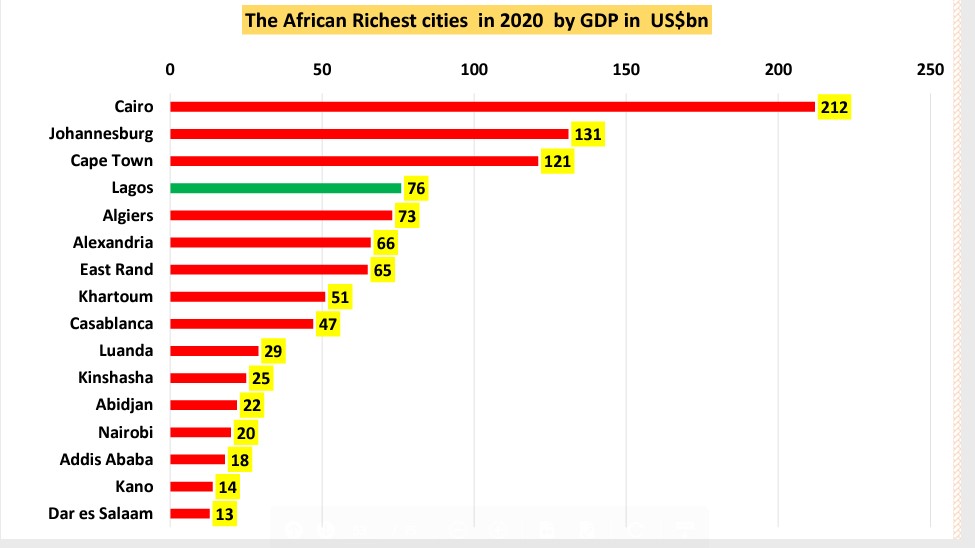
If Lagos were a country
Despite being smaller than Africa’s biggest economies, the GDP of Lagos state is often compared with other African countries as if it were a country.
In its 2021 report, the LBS revealed that the GDP of Lagos was N26.59 trillion, an equivalent of $61.9 billion using the official exchange rate of N429.43 and $38.4 billion using the current N692 parallel market rate.
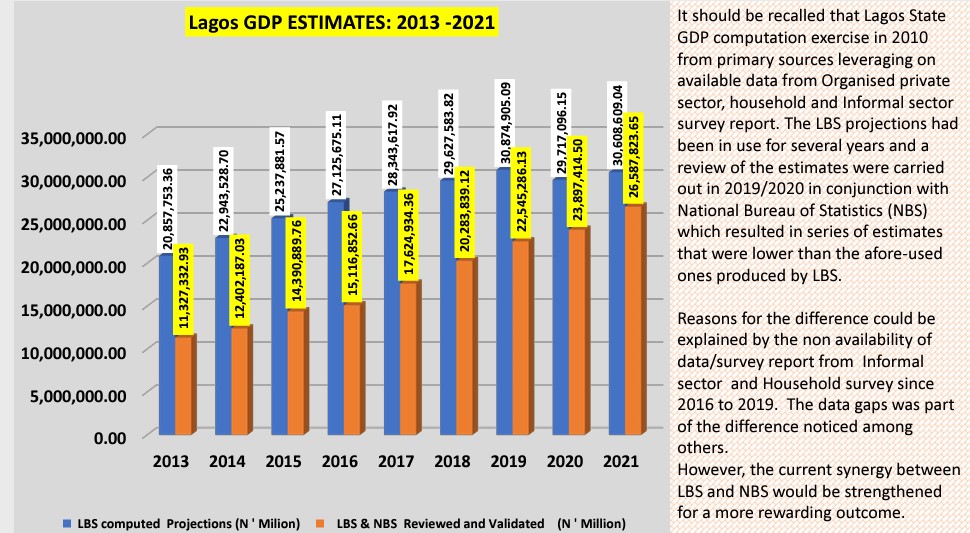
TheCable compared Lagos to other African countries using the 2021 data.
Using the official exchange rate in converting the GDP numbers provided by LBS and NBS, Lagos ranked 12th in Africa and 16th going by the parallel market rate.
| S/N | Country | GDP USD billion |
|---|---|---|
| 1. | Nigeria | $440.7 billion |
| 2. | South Africa | $419.9 billion |
| 3. | Egypt | $404.1 billion |
| 4. | Algeria | $167.9 billion |
| 5. | Morocco | $142.8 billion |
| 6. | Ethiopia | $111.2 billion |
| 7. | Kenya | $110.3 billion |
| 8. | Ghana | $77.5 billion |
| 9. | Cote d’Ivoire | $69.7billion |
| 10. | Tanzania | $67.8 billion |
| 11. | Angola | $67.4 billion |
| 12. | Lagos | $61.9 billion (Official rate) |
| 13. | Congo DR | $55.3billion |
| 14. | Cameroon | $45.3 billion |
| 15. | Uganda | $40.5 billion |
| 16. | Lagos | $38.4 billion (Parallel market) |
| 17. | Sudan | $34.3 billion |
GDP figures above are from the World Bank, with the exception of Lagos, which was extracted from the LBS.
Verdict
Lagos is neither the third largest economy nor the largest economy in Africa as claimed by Tinubu and Shettima. Compared to major cities on the continent, the Lagos state government itself, admits that the state is the fourth biggest economy in Africa.
Editor’s note: TheCable cannot independently state what Lagos IGR was for the month of May 1999, when Tinubu took office. Links from the CBN which should provide data for 1999 and 2000 are broken and unavailable. However, the annual IGR for the year 1999 in Lagos was N14.6 billion, which implies a monthly average of N1.2 billion.
Add a comment

